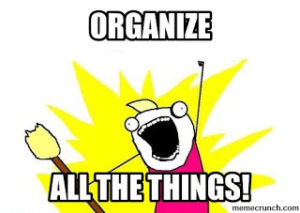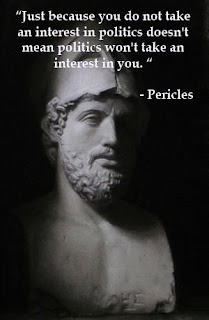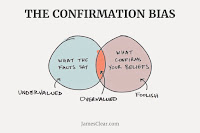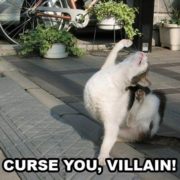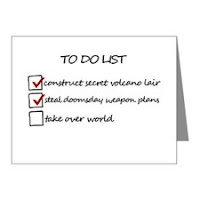Winging It
Earlier this month, fellow Stiletto Gang author Bethany Maines posted a great blog about how she organizes her novels using spreadsheets and graphs — all online! I was super impressed. And then intimidated. Because my organization of a novel looks a lot more like this:
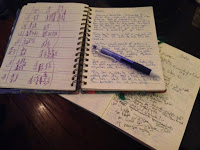 I do start out trying to be super organized. I spend a lot of time procrastinating…er…pre-writing by creating elaborate systems and files that some part of me knows I will never maintain. I understand that that the more up-front work I do, the less back-end work I’ll have to do. And yet, inevitably, at some point during a writing project I find myself digging through various notebooks and poorly named Word files, trying to find that one piece of information I need to complete whatever section I’m working on. I have to scan first drafts specifically for continuity errors (like the spelling of a name), and if it wasn’t for eagle-eyed readers and editors, I’d miss small changes I made in even basic descriptions (did that room have a brown leather chair or a burgundy leather chair?). I don’t even remember to put all my notes about the same story in the same notebook.
I do start out trying to be super organized. I spend a lot of time procrastinating…er…pre-writing by creating elaborate systems and files that some part of me knows I will never maintain. I understand that that the more up-front work I do, the less back-end work I’ll have to do. And yet, inevitably, at some point during a writing project I find myself digging through various notebooks and poorly named Word files, trying to find that one piece of information I need to complete whatever section I’m working on. I have to scan first drafts specifically for continuity errors (like the spelling of a name), and if it wasn’t for eagle-eyed readers and editors, I’d miss small changes I made in even basic descriptions (did that room have a brown leather chair or a burgundy leather chair?). I don’t even remember to put all my notes about the same story in the same notebook.
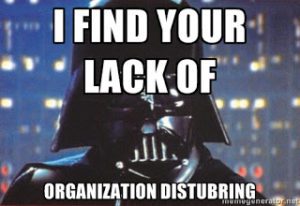 Of course, come revision time, I then I have to backtrack and do all the work that I maybe shoulda coulda woulda done in the pre-writing process. I create a reverse outline of my chapters and sections. I make a style sheet and finally decide on a single spelling of a name (the search and replace feature in Word is very much my friend). Changes are always intentionally planned. I invest heavily in the revision process, and the story can change dramatically from draft to draft.I also only ever make it half-way through a novel outline before the drafting process takes over, and characters and plots move in totally different directions. It’s a little bit because I find outlines kind of boring, and a little bit more that if I get too detailed and figure out how it will all end, I lose interest. Generally, I never start with more than a vague sense of where I want to end up, and I find drafting it out so much more satisfying. And yet I know that an outline would probably make the entire process a lot less messy — and faster — if maybe not as spontaneous.
Of course, come revision time, I then I have to backtrack and do all the work that I maybe shoulda coulda woulda done in the pre-writing process. I create a reverse outline of my chapters and sections. I make a style sheet and finally decide on a single spelling of a name (the search and replace feature in Word is very much my friend). Changes are always intentionally planned. I invest heavily in the revision process, and the story can change dramatically from draft to draft.I also only ever make it half-way through a novel outline before the drafting process takes over, and characters and plots move in totally different directions. It’s a little bit because I find outlines kind of boring, and a little bit more that if I get too detailed and figure out how it will all end, I lose interest. Generally, I never start with more than a vague sense of where I want to end up, and I find drafting it out so much more satisfying. And yet I know that an outline would probably make the entire process a lot less messy — and faster — if maybe not as spontaneous.
In many ways, starting off by winging it and then going back and organizing what I’ve written lets me discover the story in two different ways — as I write it, and after I go back and read what I’ve written. That process of discovery keeps me interested in the story, even if it is very labor intensive.
Still, I can’t help but look at the ways other writers organize themselves and wistfully daydream about my own set of spread sheets and graphs. Sometimes though, I’d settle for remembering exactly where I put that really great breakdown of the third act I thought of while on the bus two months ago. All I have to do is figure out what notebook I had with me that day…
Originally posted on The Stiletto Gang blog on April 19, 2016.


